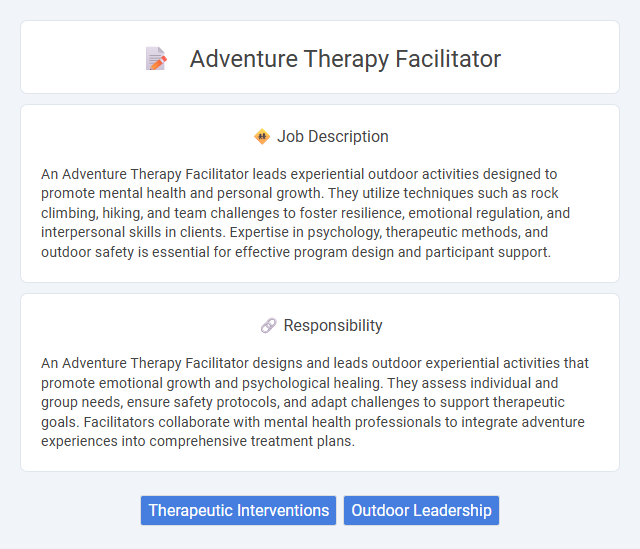
An Adventure Therapy Facilitator leads experiential outdoor activities designed to promote mental health and personal growth. They utilize techniques such as rock climbing, hiking, and team challenges to foster resilience, emotional regulation, and interpersonal skills in clients. Expertise in psychology, therapeutic methods, and outdoor safety is essential for effective program design and participant support.
Individuals who are empathetic, patient, and possess strong communication skills are more likely to thrive as adventure therapy facilitators. Those comfortable working with diverse groups facing emotional, behavioral, or mental health challenges may find this role particularly suitable. It is probable that people who enjoy outdoor activities and have a passion for helping others develop resilience will excel in this position.
Qualification
Adventure therapy facilitators typically require a background in psychology, counseling, or social work, often holding a bachelor's or master's degree in these fields. Certification in adventure-based counseling or experiential therapy, such as those offered by the Association for Experiential Education (AEE), enhances credibility and effectiveness. Strong skills in risk management, group facilitation, and outdoor leadership are essential to safely guide therapeutic adventure activities and support client growth.
Responsibility
An Adventure Therapy Facilitator designs and leads outdoor experiential activities that promote emotional growth and psychological healing. They assess individual and group needs, ensure safety protocols, and adapt challenges to support therapeutic goals. Facilitators collaborate with mental health professionals to integrate adventure experiences into comprehensive treatment plans.
Benefit
Adventure therapy facilitators likely enhance participants' emotional resilience and problem-solving skills through guided outdoor activities. Engaging in physically challenging and collaborative experiences may improve mental health by reducing stress and building self-confidence. The role probably offers facilitators the chance to make a meaningful impact on individuals' personal growth and well-being.
Challenge
An Adventure Therapy Facilitator likely faces the challenge of creating a safe yet stimulating environment where clients can confront and overcome personal fears through physical and emotional challenges. Balancing risk management with therapeutic outcomes probably requires strong problem-solving skills and adaptability. The role may demand continuous innovation to tailor activities that meet diverse client needs while fostering trust and resilience.
Career Advancement
Adventure therapy facilitators gain specialized skills in outdoor experiential learning and therapeutic techniques, enhancing their professional expertise. Opportunities for career advancement include roles such as clinical supervisors, program directors, or licensed therapists specializing in trauma and behavioral health. Obtaining certifications like Registered Adventure Therapist (ATR) and pursuing advanced degrees in psychology or counseling can significantly boost career growth and salary potential.
Key Terms
Therapeutic Interventions
Adventure therapy facilitators design and implement therapeutic interventions that combine physical activities like rock climbing, hiking, and team challenges to promote mental health and emotional growth. These interventions leverage experiential learning and outdoor environments to enhance self-awareness, resilience, and coping skills among participants facing anxiety, depression, or trauma. Facilitators employ evidence-based techniques such as reflective discussion and goal-setting to maximize the therapeutic impact of adventure experiences.
Outdoor Leadership
An Adventure Therapy Facilitator specializes in using outdoor leadership skills to guide therapeutic activities that promote mental health and personal growth. Proficiency in wilderness navigation, risk management, and group dynamics ensures safe and impactful experiential learning in natural settings. Expertise in facilitating trust-building exercises and resilience training enhances participants' emotional well-being through structured outdoor challenges.
 kuljobs.com
kuljobs.com